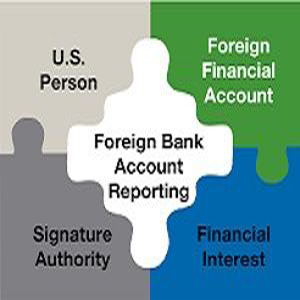Say you are a United States person who owns or has signature authority over financial accounts outside the United States, and the aggregate amount in those foreign accounts exceeds a reporting threshold amount during any day of the calendar year. In such cases, you are required to report these foreign accounts to the office of Financial Crimes Enforcement Network (FinCEN), a bureau of the Department of the Treasury, by filing the Report of Foreign Bank and Financial Accounts (FBAR).
United States person: United States person includes: (1) U.S. citizens (including minor children) (2) U.S. residents (3) Trusts or estates formed under the laws of the United States (4) Entities, including but not limited to, corporations, partnerships, or limited liability companies, that are created or organized in the United States, or under the laws of the United States.
Foreign financial accounts: Foreign financial accounts include bank account, brokerage account, mutual fund, trust, cash value of insurance policies and annuities, or other type of foreign financial accounts in a foreign country. The physical location, not the nationality, is considered when determining whether a financial account is a foreign financial account.
Aggregate amount threshold: As of 2016, the aggregate amount threshold was $10,000. If the aggregate value of all foreign financial accounts exceeds this threshold amount at any time during the reporting calendar year, you are required to file an FBAR. The foreign currency amounts are converted to U.S. dollars based on the Internal Revenue Service (IRS) exchange rates.
The annual due date for filing an FBAR is April 15 with automatic maximum 6-month extension up to October 15.
Those required to file an FBAR, who fail to properly file a complete and correct FBAR, may be subject to civil monetary penalties. Taxpayers, who have not filed a required FBAR and are not under a civil examination or a criminal investigation by the IRS, and those who have not already been contacted by the IRS about a delinquent FBAR, should file any delinquent FBARs and include a statement explaining why the filing is late. The IRS will not impose a penalty for the failure to file the delinquent FBARs if the following conditions are met:
Income from the foreign financial accounts reported on the delinquent FBARs is properly reported
Taxes are paid on your U.S. tax return, and
You have not previously been contacted regarding an income tax examination or a request for delinquent returns for the years for which the delinquent FBARs are submitted.
Taxpayers with specified foreign financial assets that exceed certain thresholds must report those assets to the IRS on Form 8938, Statement of Specified Foreign Financial Assets, which is filed with an income tax return. Those foreign financial assets could include foreign accounts reported on an FBAR. The Form 8938 filing requirement is in addition to the FBAR filing requirement. To learn whether you are required to file an FBAR, IRS Form 8938, or both, Click Here.
Consult with your CPA to determine whether you are required to disclose your foreign financial accounts, and if so, whether you need to file an FBAR, IRS Form 8938, or both.








